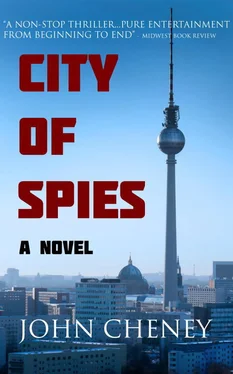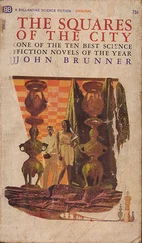On the roof, the sniper watched for the guards in the tower to move. From the corner of his eye, he kept watch on the guards who were running toward Hans from the Gate.
The sniper’s shot had given Hans just enough time to use every bit of strength in his arms and pull himself up onto the Wall. But the guards in the tower were not finished. The older guard looked back toward the broken window, and then rose up just enough to point his rifle at Hans one more time. He aimed, and certain of his target, squeezed the trigger.
At that very moment, a second shot came into the tower, driving through the guard’s shoulder and throwing him off-balance. The bullet exited the guard’s shoulder and impacted the concrete wall in front of him, spraying an odd mist of atomized blood and pulverized concrete into the guard’s face and eyes. He shrieked in pain and immediately fell to his knees.
The guard’s errant shot hit Hans in the left arm just as he had leveraged his right leg to pull the rest of his body up onto the Wall. Hans rolled onto the flat surface on top of the Wall and looked back. The guards on foot were now only about twenty feet away, their guns aimed.
Despite the pain in his arm, Hans began to roll across the top of the Wall, keeping his body as flat as possible to avoid making himself a target for the men below. There was nothing he could do to avoid the guards in the tower, but for now, they had stopped firing.
From his perch on top of the roof, the sniper kept his vigil over Hans and targeted the soldiers on the ground. These guards had little to aim at, with Hans hunkered down above them, but they still opened a barrage of gunfire.
Hans clambered across the top of the Wall, dodging the concrete shrapnel from bullet hits behind him.
The sniper sent covering fire toward the guards, making the men dive for cover.
Hans finally reached the western edge of the Wall’s surface. With his last bit of strength, he flung himself over.
He fell, a drop that felt endless, and landed hard.
Suddenly, there was only intense pain, then darkness.
Gradually, there was light—no, a whole series of lights. They led away from Hans, converging in the air at a brilliantly lit point. As he adjusted his eyes, he could see the golden wings of an angel.
For a moment, Hans thought he was dead. Then, the image slowly came into focus. It was the Siegesaule , the Victory Column, a towering landmark of West Berlin. The golden statue of the goddess Victoria stood aloft on the column, its angel wings outstretched as it pointed westward. Hans now recognized the streetlights of the Strasse 17. Juni, named for the date of the failed GDR-wide anti-communist revolt. The lights converged at a vanishing point somewhere beyond the statue.
Hans pulled himself up slowly and took in the view. He was in the West, finally free.
For the rest of the night, GDR authorities struggled to orchestrate order out of chaos. Foremost on the Defense Minister’s mind was keeping the entire Operation STOSS fiasco under wraps. Surprisingly, the Minister immediately ordered that the Republic Day Parade would go on as scheduled at noon. The Defense Ministry conducted a hurried investigation that night, bringing in many of the field commanders to question them about the operation. Most of them claimed they were duped into the operation, believing they were operating under Honecker’s orders. For many of the soldiers outside of Thorwald’s inner circle, this was true. The Soviet military model did not breed initiative. The majority of soldiers only knew how to work under strict orders. The Ministry gave these men a story that the mission had been an aborted exercise. For those who trusted the Ministry’s explanation, they were simply told it showed the readiness of the GDR’s troops. For those who made further inquiries, and could be told, the Ministry admitted that this particular exercise had made the Soviets uncomfortable enough to warrant its cancellation. They were entrusted to not speak of it further. Curiously, the ruse generally worked.
Thorwald and his co-conspirators were secretly placed on trial for Treason against the State. All were convicted, with most sentenced to life imprisonment. But two years’ into Thorwald’s sentence, three guards took him from his cell, telling him they were transferring him to another prison. Instead, they brought Thorwald to a remote location in the woods, then shot him. While the execution was carried out under the State Council’s orders, no single person ever claimed responsibility for the act. The Stasi conspirators also fared poorly, with many of the men also receiving life sentences.
Though the Stasi Minister had plausible deniability, pleading ignorance to the entire plot, he was held at arm’s length for several months by other key members of the government. Within time, the incident was forgotten, as the Stasi Minister proved his ever-loyal devotion to Honecker’s leadership.
Brüske was perhaps the luckiest of the lot; when he learned the invasion had failed, he disappeared that night. Before investigators could catch up with him, Brüske had made his way to Bulgaria, where he spent most of the next four years living a largely secret existence. In 1989, rumors circulated that he had taken up with the Romanian Security Police to try and stop the overthrow of Nicolae Ceausescu. By the end of 1989, Brüske fled to Russia, where he disappeared altogether.
Next to the failed invasion, an even stranger controversy began to brew. The Brandenburg Gate, of all places, had been the location of one of the strangest escapes in the history of the Berlin Wall. A lieutenant colonel of the Border Troops had made a break for the Wall on a motorcycle, and had apparently been aided by an unseen sniper who provided cover fire. As ballistics teams pulled the sniper’s bullets out of the guard tower and the plaza in front of the Wall, they were shocked to find the rounds were East German military-issue—most likely fired by a Dragunov rifle. None of the facts of the case made sense—why would one of the Border Troops’ own escape, aided by another comrade who stayed in the East, but willingly fired on his own comrades?
The disturbing possibility of an enemy in their midst sent waves of distrust throughout the Border Troops’ ranks. Slowly, another discomforting theory surfaced, this one floated by the Stasi—Lieutenant Colonel Hans Brandt was an American mole who had secretly betrayed the GDR’s deepest military secrets to NATO forces. Once exposed, he used his subversive contacts to make good on his escape. The Defense Minister dismissed this claim as ludicrous, though he simply could not bear the idea that he had directly aided the rise of a traitor. Members of the Stasi who believed that Scharf had been targeted by American agents were more convinced.
In early 1986, Stasi officers learned Libyan agents were using their embassy in East Berlin to plan a terrorist attack against Americans. The Stasi officers who first learned of the plot reported it to their superiors, fearing the consequences of inaction. However, nothing developed from the officers’ report, and on the night of April 5, 1986, an explosion rocked the West Berlin discotheque La Belle . Two American servicemen and a civilian woman were killed. Another 230 were injured, including 50 American soldiers. President Reagan retaliated by launching air strikes on the Libyan cities of Tripoli and Benghazi. The incident was a diplomatic black eye for the GDR, as western governments used the event to bolster claims that the GDR supported terrorism. Most Stasi officials who knew of the prior intelligence felt the inaction was motivated by simple anti-American spite. Those few who knew about the Hans Brandt affair considered it retribution.
Читать дальше












